The Lydian language
The Lydian language
Just like the name “Phrygia”, Lydia recalls of a music scale, a female name or maybe Saint Lydia. You probably didn't know it was the name of a country, neither that the basis of our economic system (coinage) was founded there. It could have been one of the worlds famous superpowers, if it hadn't been defeated by the Persians. The worlds first famous wealthiest man in history, namely Croesus was a Lydian, whose name became synonymous to “wealth” and was attributed as an epithet to men like Aristoteles Onassis and Bill Gates.A short history of Lydia
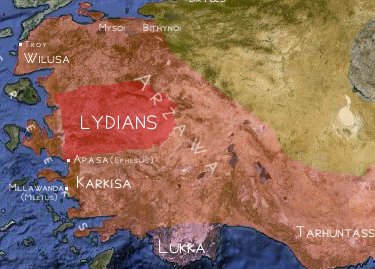 Lydia
There are numerous arguments about the etymology of the geographic name Lydia. For a complete summary see Yakubovich (2008:138).
got its name from Lydus, a Lydian hero who was the ruler of the Maeonians, the name of Lydias
population at that time
It is worth to mention that the complete absence of references to Lydia and the Lydians during the second half of the 2nd millennium B.C might be to the fact that early Lydian history is transmitted to us in disguise as the history of the Mysians. For the full story of this interesting argument see Beekes (2003b: 13-15)..
It is said that the Etruscans, also known by the name Tyrrhenians, were a part of that
population. During a great famine it was decided that the Tyrrhenians had to leave the land, in order to save the other half of
the population
Herodotus – Histories, Book 1. Lydias pre-history however, must be traced in the state of Arzawa
Arzawa existed as a state between the 15th and the early 12th century BC. , a kingdom that was a direct threat to the Hittite Empire. Arzawa was located on the western
part of Anatolia, stretching from Wilusa (Troy) in the north to the borders of Caria in the south, having Apasa ( Ephesus ) as
its capital. Its population must have been mixed, including mainly the ancestors of the Lydians, Luwians, but also Minoan and
Mycenaean minorities around Miletus and Ephesus. Arzawa reached its climax in the early fourteenth century BC under the reign of
Tarhuntaradu. At this time the Egyptian pharaoh Amenhotep III contacted dU-taradu (= Tarhuntaradu) and asked for his daughter in
marriage. This request apparently came as a surprise to Tarhuntaradu, who demanded its written confirmation. During the time of
the Hittite Kings Suppiluliuma I and Mursili II, Arzawa fell gradually and became a vassal state of the Hittites. This didn't
last long though, since the Hittite Empire collapsed and the Lydian state was born. The first dynasty were the Atyads, continued
by the Heraklides who according to the tradition descended partly from the lineage of Herakles. The last King of the Heraklides
was Candaules ( also known as Myrsilos ), who had a particular fetish; proving everyone the beauty of his wife, who he considered
being the most beautiful woman in the world. It was during the rule of the Mermnadae dynasty that Lydia became a superpower.
Gyges was the first King; he made Lydia a military power and transferred the capital from Hyde to Sardis ( near modern Turgutlu).
He was succeeded by Ardys II, during the rule of who, the people of Anatolia suffered from the Cimmerians
The Cimmerians were nomads of Indo-European origin who had been expelled from their lands by the Scythians, another group of Indo-European origin.,
who invaded their lands, destroyed the Phrygian kingdom and plundered most of the cities in
the region. Only the Lydians together with the Asiatic Greeks managed to withstand this invasion. After Ardys II, Sadyattes
followed and after Sadyattes, in ~ 619 BC, Alyattes II becomes the successor. He was one of the most successful Kings; he made
Lydia a great power, took under his command several Greek cities, annihilated the Cimmerians in Anatolia and managed to secure
his people against the Medean invasion of Cyaxares (Uvaxštra). The aforementioned Croesus became Alyattes successor. He made
Lydia, a country of remarkable wealth and strong enough to defeat any enemy nation. He conquered the rest of the Hellenic cities
of Asia Minor but did not proceed towards the Aegean. After being advised by the Delphic Oracle, he made an alliance with Sparta
who he considered the strongest military power of the Greeks and the key to the conquest of Asia. However, the Delphic oracle did
also tell Croesus that if he attacked Persia he would destroy a great empire. This famous statement was the end of the Lydian
empire, because the oracle actually meant that the empire that would be destroyed would be Lydia and not Persia, as Croesus
wanted to believe. After a draw against Cyrus the Great of Persia, at the Halys river, Croesus lost his last battle in his own
city Sardis, a loss that put an end forever to the Lydian state. There are various versions about what really happened to Croesus
after the loss. It is said that he was put into the fire but was saved in the last minute by a divine power.
Lydia
There are numerous arguments about the etymology of the geographic name Lydia. For a complete summary see Yakubovich (2008:138).
got its name from Lydus, a Lydian hero who was the ruler of the Maeonians, the name of Lydias
population at that time
It is worth to mention that the complete absence of references to Lydia and the Lydians during the second half of the 2nd millennium B.C might be to the fact that early Lydian history is transmitted to us in disguise as the history of the Mysians. For the full story of this interesting argument see Beekes (2003b: 13-15)..
It is said that the Etruscans, also known by the name Tyrrhenians, were a part of that
population. During a great famine it was decided that the Tyrrhenians had to leave the land, in order to save the other half of
the population
Herodotus – Histories, Book 1. Lydias pre-history however, must be traced in the state of Arzawa
Arzawa existed as a state between the 15th and the early 12th century BC. , a kingdom that was a direct threat to the Hittite Empire. Arzawa was located on the western
part of Anatolia, stretching from Wilusa (Troy) in the north to the borders of Caria in the south, having Apasa ( Ephesus ) as
its capital. Its population must have been mixed, including mainly the ancestors of the Lydians, Luwians, but also Minoan and
Mycenaean minorities around Miletus and Ephesus. Arzawa reached its climax in the early fourteenth century BC under the reign of
Tarhuntaradu. At this time the Egyptian pharaoh Amenhotep III contacted dU-taradu (= Tarhuntaradu) and asked for his daughter in
marriage. This request apparently came as a surprise to Tarhuntaradu, who demanded its written confirmation. During the time of
the Hittite Kings Suppiluliuma I and Mursili II, Arzawa fell gradually and became a vassal state of the Hittites. This didn't
last long though, since the Hittite Empire collapsed and the Lydian state was born. The first dynasty were the Atyads, continued
by the Heraklides who according to the tradition descended partly from the lineage of Herakles. The last King of the Heraklides
was Candaules ( also known as Myrsilos ), who had a particular fetish; proving everyone the beauty of his wife, who he considered
being the most beautiful woman in the world. It was during the rule of the Mermnadae dynasty that Lydia became a superpower.
Gyges was the first King; he made Lydia a military power and transferred the capital from Hyde to Sardis ( near modern Turgutlu).
He was succeeded by Ardys II, during the rule of who, the people of Anatolia suffered from the Cimmerians
The Cimmerians were nomads of Indo-European origin who had been expelled from their lands by the Scythians, another group of Indo-European origin.,
who invaded their lands, destroyed the Phrygian kingdom and plundered most of the cities in
the region. Only the Lydians together with the Asiatic Greeks managed to withstand this invasion. After Ardys II, Sadyattes
followed and after Sadyattes, in ~ 619 BC, Alyattes II becomes the successor. He was one of the most successful Kings; he made
Lydia a great power, took under his command several Greek cities, annihilated the Cimmerians in Anatolia and managed to secure
his people against the Medean invasion of Cyaxares (Uvaxštra). The aforementioned Croesus became Alyattes successor. He made
Lydia, a country of remarkable wealth and strong enough to defeat any enemy nation. He conquered the rest of the Hellenic cities
of Asia Minor but did not proceed towards the Aegean. After being advised by the Delphic Oracle, he made an alliance with Sparta
who he considered the strongest military power of the Greeks and the key to the conquest of Asia. However, the Delphic oracle did
also tell Croesus that if he attacked Persia he would destroy a great empire. This famous statement was the end of the Lydian
empire, because the oracle actually meant that the empire that would be destroyed would be Lydia and not Persia, as Croesus
wanted to believe. After a draw against Cyrus the Great of Persia, at the Halys river, Croesus lost his last battle in his own
city Sardis, a loss that put an end forever to the Lydian state. There are various versions about what really happened to Croesus
after the loss. It is said that he was put into the fire but was saved in the last minute by a divine power.
Origins of the Lydians
Lydians were a group of Indo-European people in Western Anatolia. Their origins may be traced in the kingdom of Arzawa, but none can speak about them with certainty. There are various theories about the pre-Lydian speakers at the end of the third millennium B.C. Some evidence suggests that they were of Luwian origin, just like Lycians and Carians, but on the other hand there's evidence that a Luwian substrate (alternatively superstrate) existed and affected the non-Luwic speaking Lydians Craig Melchert – The Luwians, Leiden 2003 Yakubovich (2008:95) - “Arzawa personal names analyzed in Section 3.3 are shown to be at least equally compatible with an alternative hypothesis, according to which the native language of Arzawa aristocracy was proto- Carian, while a part of the population spoke proto-Lydian” & “...we have limited evidence for a Hittite-Luwian superstrate in Lydian, which can be explained through the first cultural and then political dominion of the Hittite state over the western part of Asia Minor.”. Their proto-Anatolian ancestors must have splitted up in Anatolia around 3000 B.C, where they divided into the speakers we know of in the 2nd millenium BC. It is also very possible that this split-up did not occur in Anatolia, but outside it (e.g the Balkans) Carians should be a good example of such a scenario, since Greek tradition locates them in the Greek mainland and the Aegean islands. and that its speakers entered the Anatolian plateau in waves, allowing them to develop in isolation from each other See Steiner (1990 202f). It seems that the Lydians were such a case of isolation, which means that their position amongst the other Anatolians remain special and has to be further investigated. Their geographic location brought them at an early stage in close contact (and later symbiosis) with the Greeks, therefore their culture seems to have been more similar to the Hellenic, rather than the one of their Anatolian counterparts.The Lydian language
Lydian was undoubtedly an Indo-European language, part of the Anatolian subgroup See Meriggi 1936, and Melchert 1994a:6f.. It is attested on coins, graffiti and inscriptions that number now a little over a hundred, covering a period from the end of the eighth to the late third century. Unfortunately most of those inscriptions are short, therefore compared to Hittite, Luwian, Palaic and Lycian our knowledge of Lydian is extremely limited The basic grammatical structure of most sentences is clear but the understanding of the semantic content is really poor. Anything expressed about Lydian is a mere hypotheses, of varying degrees of plausibility and not as established facts.. The language has a number of features that are not shared by any other language of the Anatolian group and also an agglutinative quality that distinguishes it from all other Indo-European languages. Earlier suggestions that the resemblances between Lydian and the other Anatolian languages are due to convergence are no longer tenable.Phonology
One of the phonological peculiarities of Lydian is the loss of word-initial “laryngeal(s), specifically what is reflected as h- in Hittite and Luwian (e.g the development *huhha- →*uhha-). Furthermore, Lydian has no glides. However there is a striking feature, that makes it different from all other Indo-European languages: The massive syncope and regular apocope of original final short vowels combine to produce consonant clusters more typical of Caucasian languages.A summary of the Lydian phonology can be seen in the table below The table is a summary of C. Melchert's phonology section of Lydian in the book Ancient Languages of Asia Minor.:
|
Consonants
|
Stops
Lydian has a single set of stop phonemes which are most probably voiceless:
Fricatives and affricates
Sonorants
|
|
Vowels
|
|
Pronominal clitics The analysis is taken directly from Yakubovich (2008: 223)
Because of the lack of religious texts (that would require the extensive use of the second person), our knowledge of Lydian pronominal clitics is limited to the first and the third person pronouns.|
|
Nominative |
Accusative |
Dative |
Dat. Reflexive |
|---|---|---|---|---|
|
1rst person |
(none) |
=m |
=m |
=m |
|
2 nd person |
N/A |
N/A |
N/A |
N/A |
|
3 rd person |
=aś/=ad |
=aν/=ad |
=mλ |
=is /=ś, =iτ /=τ |
The Lydian clitic =mλ represents a secondary formation based on a dative plural clitic =mś ‘to them’ (Carruba 1969: 44-45). Other pronouns, however, are likely to continue Proto-Anatolian clitics. The allomorphs =is and =iτ frequently take the place of =ś and =τ respectively in the position of a syllabic nucleus. Since Lydian lost most of its word-final vowels, at least in writing, the clitic =m can phonetically be derived from both *=mi < *=moi and *=mu. The same, mutatis mutandis, is true of Lydian =is /=ś, except that only =si/=se < *=soi is attested in the other Anatolian languages. The forms =iτ /=τ, however, can be derived only from *=ti < *=toi and not from *=tu since the grapheme τ stands for an affricate /ts/ (vel sim.), which represents the regular outcome of the Proto-Anatolian cluster */tj/. Thus =τ before a vowel emerges as a regular reflex of the Anatolian sandhi variant =t(i)y (e.g. ak=τ=ad < *a=ku=t(i)y=ad), while =(i)τ in other positions can be seen as an analogical generalization of this variant. The direct reflex of =ti in Lydian would be **=t, but the preservation of this variant would have resulted in an undesirable homonymy with another Wackernagel clitic reflecting the Proto-Anatolian sentential particle *=ta. The reflexive clitic =m is prominent in Lydian ownership inscriptions, where it functions as the first person marker in nominal sentences (Melchert 1991: 138, fn. 14). This explanation is superior to the account of Gusmani 1971, deriving =im from the Indo-European copula *esmi ‘am’, since neither Lydian, nor the other Anatolian languages normally employ the present stem copula.
Reflexives For further info see Yakubovich (2008: 228)
|
|
Nominative
|
Accusative
|
Dative
|
Dat. Reflexive
|
|
|---|---|---|---|---|---|
|
1
st person
|
(none)
|
=m
|
=m
|
=m
|
|
|
2
nd person
|
(none)
|
?
|
*=m
λ
|
*=
i
τ/=τ ↓
|
|
|
3
rd person
|
=aś/=ad
|
=aν/=ad
|
=m
λ
|
=iτ /=τ
|
=is /=ś
|
Morphology
The Lydian noun and adjective have singular and plural. There are two genders, animate and inanimate. Assured cases include only nominative, accusative, and dative-locative. It is not sure if there is a distinct genitive case. In order to express possession a relational adjective which agrees with the head noun in gender, number and case is used. This is a characterizing feature of western Anatolian, shared with Luwian, Lycian, and surely also the poorly attested Carian, Pisidian, and Sidetic. The verb has three persons and two cases(present-future and preterite).The Lydian alphabet
The Lydian alphabet was a Greek derived alphabet of 26 letters, extended in such a way to fit the Lydian phonology. The table The Lydian alphabet as presented on H. Craig Melcherts chapter about Lydian in the book “Ancient Languages of Asia Minor”, Cambridge University Press 2008 below describes the letters used: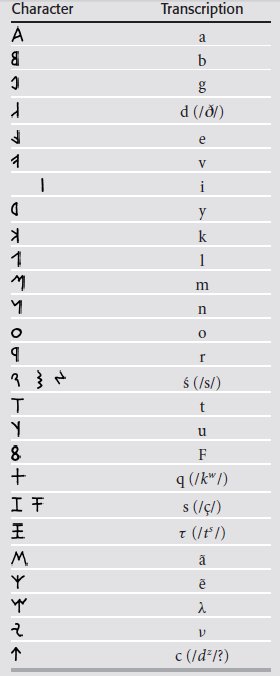
Sample Glossary
Below you will find some Lydian words and their relation to other Indo-European languages.|
Lydian
|
Meaning
|
Comments
|
|---|---|---|
|
ama
|
to love
|
H. Luwian “áza-”, Latin “amor”, Greek “
ammia” (
mother)
|
|
amu
|
I, me
|
Lycian “emu, amu”, H. Luwian “á-mu”, Palaic “=mu”,Greek “
eimi”
|
|
aλa
|
other
|
Greek “
allos/alla”,Armenian “a
il”, Gaulish “alla”,
Oscan “allo”,
Tocharian “alak-”
|
|
brafr
|
a member of the commune
|
Phrygian “brater-”, Greek“
phrater”
, Old Persian“
brata”
,
Sanskrit “
b
hrátár”,
Latin ”
frater”
, Old Norse “broðir”, Lithuanian “broterelis”
|
|
ciw
-
|
God
|
Hittit
e “šiu-”,C.Luwian “siwata”, Luwian “tiwat”, Palaic “tijaz”, Mycenean Greek “
di-wo” - Zeus, Latin “deus”, Sanskrit “deva”, Phrygian “
tiweia”
(
goddess
)
, Thracian ”
ziu”, Old Persian “daiva” evil god
|
|
da-
|
to give
|
Hittite “da”,
Latin “
dare”,Greek “
didomi”
,
Sanskrit “dadati”, Armenian “dal”, Lithuanian “duoti”, Latvian “dot”, O.C Slavonic
“dati”
|
|
daul-
|
to press
|
C. Luwian “damaš”, Avestan “dvaidī”, O.C Slavonic “davljǫ”
|
|
endo
|
into
|
C. Luwian “andan”, Hittite “antan”, Greek “
endon”
,
Proto
-Armenian “*en”, Tocharian “yn-/en-”, Avestan “antara-”, Albanian “nder” (between,
in)
|
|
kana
|
wife
|
Hittite “*kuųan-”, C. Luwian “wānā-”, Greek Myc. “ku-na-ja” (woman) - Arcado-Cypriot
“ku-na”, Armenian “kin”, Phrygian “
knaika”
,
Old Prussian “*gena”
|
|
ni-
|
not
|
C. Luwian “nā”, Hittite “natta”, Latin “nē”, Oscan “nei”, Albanian “nuk”, Avestan
“na-”
|
|
qaλmλu
|
king
|
Carian “gela, kδouś”, Hittite “haššu-”, Greek “
koiranos”
|
|
śuũoś
|
son
|
Hittite “uųan”
Uncertain, see Hrozný 1929:297, Greek “uios”, Sanskrit “sunu”, Lithuanian “súnus”, Armenian
“ustr”
|
What were the Lydians writing?
The surviving Lydian texts available right now are a little over one hundred. Only thirty of them consist of more than a few words and are reasonably complete. The bulk of these are sepulchral in content, but several of the texts are decrees of one sort or another. Some half-dozen texts are in verse, with a stress-based meter and vowel assonance at line end See Eichner 1986a and 1993:114ff.. All but a handful of the Lydian texts have been found in or near the Lydian capital Sardis. Below you'll find some samples in Lydian:
Lydian: Nannaś Bakivalis Αrtimuλ
English: Nannas, son of Bakivali (the one of Bacchus) , (dedicated) to Artemis
Lydian: ak=mλ=is qis citollad bitaad buk mλ=is fakarsed qik
English: Whoever applies to it citolla- or cuts off anything from it for himself
Lydian: eśś wãnaś mru=k bλaso=k=iτ qid kataνil laqrisa=k=in qid ẽtośrś ak=ad karolid sabλalid
English: This tomb, and stele, and the bλaso- that he made for himself, and the dromos that they have installed, belong to Karo son of Sabla
English: Nannas, son of Bakivali (the one of Bacchus) , (dedicated) to Artemis
Lydian: ak=mλ=is qis citollad bitaad buk mλ=is fakarsed qik
English: Whoever applies to it citolla- or cuts off anything from it for himself
Lydian: eśś wãnaś mru=k bλaso=k=iτ qid kataνil laqrisa=k=in qid ẽtośrś ak=ad karolid sabλalid
English: This tomb, and stele, and the bλaso- that he made for himself, and the dromos that they have installed, belong to Karo son of Sabla
Gallery
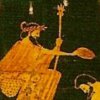
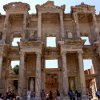


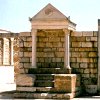

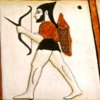
Cautions / Clarifications and FAQ about Lydian
-
Is Lydian related to Etruscan and Lemnian?
Despite the tradition that Etruscans lived amongst the Lydians, their languages are unrelated. There's no room for comparison since Lydian is clearly Indo-European while Etruscan and Lemnean are language isolates, completely alien to any known language group.
-
Is Lydian a Luwic language like Lycian and Carian?
No, it is not. Lydian has a special position within the Anatolian languages. The drawing below explains this relationship.
Further reading
- Gusmani 1964, 1980, 1982 and 1986 for texts, grammar, transliterations.
- Carruba “Zur Grammatik des Lydischen”, 1969, Athenaeum NS 47:39–83
- H. Craig Melchert - “Lydian” in “Ancient Languages of Asia Minor”, pg 56-62, 2008, Cambridge University Press
- H. Craig Melchert - “Anatolian Historical Phonology”, 1994, Rodopi
- I. Hajnal - “Lydian: Late Hittite or Neo-Luwian?”, 2001, Universität Innsbruck
Tags: Lydia, Lydian language, Lydians, Croesus, Anatolia, Asia Minor, Turkey, Persia, Anatolian Languages, Indo-European, Etruscan, Proto-Anatolian